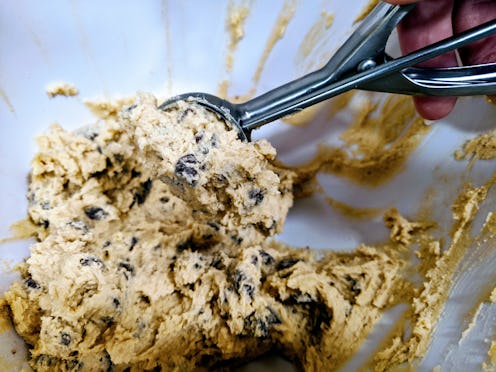Life
The FDA Is Cracking Down On Cookie Dough

It’s a sad day, folks. The Food and Drug Administration has officially declared that raw cookie dough is not safe to eat. You might be thinking, “No problem! I’ll just cut the eggs and make vegan dough!” But, oh you sweet summer child, that won’t actually solve the problem. It turns out that the safety issue with cookie dough isn’t simply raw eggs — it’s raw flour.
I’ll wait while you scream in agony.
You’re probably already aware that consuming raw eggs carries the risk of Salmonella exposure, but uncooked flour can be dangerous, too. That’s because flour can be contaminated with E. coli, a type of bacteria that can cause major intestinal problems. We tend not to think of flour as a risky food, but, in the right circumstances, it can be. “E. coli is a gut bug that can spread from a cow doing its business in the field, or it could live in the soil for a period of time; and if you think about it, flour comes from the ground, so it could be a risk,” Adam Karcz, an infection preventionist at Indiana University Health in Indianapolis, explained to The New York Times.
Usually, E. coli in flour isn’t much of a problem because people usually treat it with certain “kill steps” before consuming it; kill steps include baking, microwaving, frying, boiling, and other processes that involve cooking at a high temperature. Because it’s expected that people will cook flour before they eat it (and therefore kill any bacteria), the flour you buy in the store usually hasn’t been treated to kill bacteria or other pathogens. Flour is thus only really a problem when people eat it without cooking it — in cookie dough or cake batter, for example.
The risk of eating raw flour isn’t hypothetical: The FDA and CDC are currently investigating an outbreak of infections caused by Shiga toxin-producing E. coli O121. The CDC reports that, since December 2015, 38 people in 20 states have been infected with the bacteria after consuming raw flour, which the FDA has been able to trace to flour produced by a General Mills plant in Kansas City, Missouri. General Mills has recalled a variety of flour products from Gold Medal, Gold Medal Wondra, and Signature Kitchens. (You can find out more about the exact varieties, brand names, and dates of the recalled items here).
Exposure to E. coli O121 can cause stomach cramps and (sometimes bloody) diarrhea. Although most people get better within a week, in some cases, an E. coli infection can cause kidney failure, especially in young children, the elderly, and people with impaired immune systems.
The FDA’s guideline against consuming raw flour extends beyond cookie dough (although that alone has my soul crying out in torment). You should also avoid cake batter, brownie batter, pizza dough, bread dough, or basically any other mixture that contains uncooked flour. The FDA further advises against letting children play with “flour crafts,” such as homemade playdough, as children are likely to get raw flour on their hands and get it in their mouths. When you cook with raw flour, be sure to wash your hands and any cooking surfaces thoroughly.
If there is one silver lining to this news, it’s that commercially produced cookie dough ice cream should be OK to eat. The New York Times reports that commercially produced, so-called “raw” cookie dough (such as that in cookie dough ice cream) has usually been heat treated to kill bacteria. In this case, you’re safer going with the commercially made version than making your own.
Images: Photo by Cathy Scola/Moment/Getty Images; Giphy